Top 10 greatest emperors in China
Who was considered the best emperor of China? The criteria is difficult to define. However usually military achievements, cultural contributions and historical feats all have to be considered. Below are the top 10 greatest emperors in Chinese history.
1. Tang Taizong 唐太宗 (599 – 649) – Tang Dynasty
Tang Taizong (private name: Li Shimin) is typically considered as one of the greatest emperors in Chinese history. His “Reign of Zhenguan” was considered a golden age of Chinese history and required study for future crown princes. During Taizong’s reign, Tang was the largest and the strongest nation in the world. It covered most of the territory of present-day China, Vietnam, Mongolia and much of Central Asia as far as eastern Kazakhstan. Under Emperor Taizong Li Shimin’s wise governing, the national strength and social development reached an unparalleled prosperity. His reign saw extensive integration of different ethnic groups
2. Qin Shihuang 秦始皇(259 BC – 210 BC) – Qin Dynasty
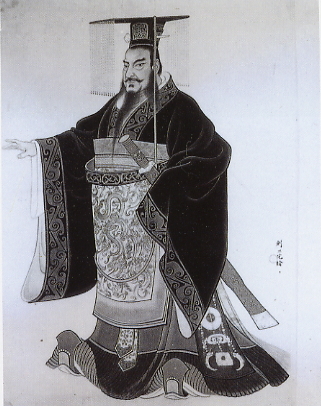 As the first emperor of China, Qin Shihuang (private name: Ying Zheng) indeed has a profound influence on Chinese history and culture. He established prefectures and counties ruled directly by the emperor; Unified currency, weights and measures. Qin Shi Huang conquered the other six ducal states and built the first feudal and centralized empire in Chinese history.
As the first emperor of China, Qin Shihuang (private name: Ying Zheng) indeed has a profound influence on Chinese history and culture. He established prefectures and counties ruled directly by the emperor; Unified currency, weights and measures. Qin Shi Huang conquered the other six ducal states and built the first feudal and centralized empire in Chinese history.
3. Han Wudi 汉武帝 (156BC–87 BC) – Han Dynasty
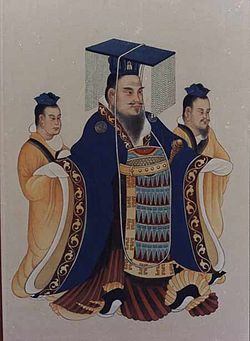 Han Wudi (private name: Liu Che) was the seventh emperor of the Han Dynasty of China, ruling for 54 years. During his reign, Emperor Han Wudi thoroughly consolidated the autocratic state of centralized power in the feudal society. His other feats include the vast territorial expansion and his promotion of Confucian doctrines.
Han Wudi (private name: Liu Che) was the seventh emperor of the Han Dynasty of China, ruling for 54 years. During his reign, Emperor Han Wudi thoroughly consolidated the autocratic state of centralized power in the feudal society. His other feats include the vast territorial expansion and his promotion of Confucian doctrines.
4. Emperor Kangxi 康熙帝 (1654 – 1722) – Qing Dyansty
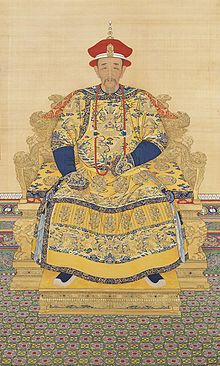 Kangxi Emperor (private name: Aixinjueluo Xuanye) is considered one of China’s greatest emperors. He suppressed the Revolt of the Three Feudatories, bringing the island of Taiwan under Qing Dynasty, blocked Tzarist Russia on the Amur River and expanded the empire in the northwest. Kangxi’s reign brought about long-term stability and relative wealth after years of war and chaos. He initiated the period known as the “Prosperous Era of Kangxi and Qianlong”, which lasted for generations after his own lifetime.
Kangxi Emperor (private name: Aixinjueluo Xuanye) is considered one of China’s greatest emperors. He suppressed the Revolt of the Three Feudatories, bringing the island of Taiwan under Qing Dynasty, blocked Tzarist Russia on the Amur River and expanded the empire in the northwest. Kangxi’s reign brought about long-term stability and relative wealth after years of war and chaos. He initiated the period known as the “Prosperous Era of Kangxi and Qianlong”, which lasted for generations after his own lifetime.
5. Sui Wendi 隋文帝 (541 – 604) – Sui Dynasty
Sui Wendi (private name: Yang Jian) was the founder and first emperor of China’s Sui Dynasty. He is regarded as one of the most important emperors in Chinese history, reunifying China in 589 after centuries of division since the fall of Western Jin Dynasty in 316. During his reign began the construction of the Grand Canal.
6. Song Taizu 宋太祖 (927-976) – Song Dynasty
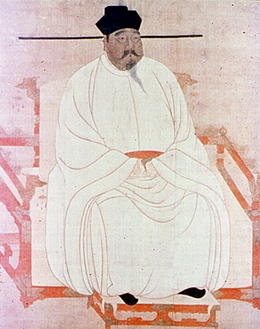 Song Taizu (private name: Zhao Kuangyin)was the founder of the Song Dynasty. He reunified most of China after following a period of political instability and fragmentation. He strengthened the central administration and weakened the power of local warlords. The Song Dynasty is known for its economic and cultural prosperity. The prominent achievements made in economy, technology, and culture placed China in the forefront of the world.
Song Taizu (private name: Zhao Kuangyin)was the founder of the Song Dynasty. He reunified most of China after following a period of political instability and fragmentation. He strengthened the central administration and weakened the power of local warlords. The Song Dynasty is known for its economic and cultural prosperity. The prominent achievements made in economy, technology, and culture placed China in the forefront of the world.
7. Ming Taizu 明太祖 (1328 – 1398) – Ming Dynasty
Ming Taizu (private name : Zhu Yuanzhang )was the founder and the first emperor of the Ming Dynasty of China. He and his army conquered China and ended the Yuan Dynasty, forcing the Mongols to retreat to the central Asian steppe. He adopted policies to develop production and to restore the strength of the state, leading to an agricultural boom and reversing the stagnation in rural areas in the early Ming Dynasty. He stepped up the effort to fight against corruption and to strengthen the country’s law. He also put great emphasis on the sturdiness and durability of the palaces.
8. Guang Wudi 光武帝 (5 BC – 57) – Eastern Han
Emeror Guangwu (private name: Liu Xiu ) was an emperor of the Chinese Han Dynasty, thus founder of the Eastern Han. He eliminated feudal separatist force and reunified the feudal country. He forgave and forgot previous ferocity and was strict with award and punishment, thus creating “Guangwu Periods of Splendor”.
9. Wu Zetian 武则天 (625-705) – Tang Dynasty
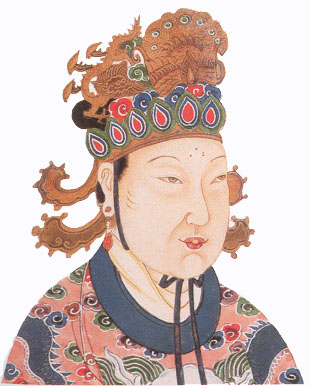 Wu Zetian (private name: Wu Xu)was the only female emperor in the Chinese feudal dynasties spanning more than 4,000 years. She was a cruel and merciless woman, who would reach her goals by fair means or foul. Nevertheless, she made great political achievements. Wu Zetian adopted some liberal and advanced political systems, including selecting talent on a large scale, conducting economic development and responding positively to expostulation.The stable society and booming economy during her reign laid a foundation for “the Kaiyuan Flourishing Age” later in the Tang Dynasty.
Wu Zetian (private name: Wu Xu)was the only female emperor in the Chinese feudal dynasties spanning more than 4,000 years. She was a cruel and merciless woman, who would reach her goals by fair means or foul. Nevertheless, she made great political achievements. Wu Zetian adopted some liberal and advanced political systems, including selecting talent on a large scale, conducting economic development and responding positively to expostulation.The stable society and booming economy during her reign laid a foundation for “the Kaiyuan Flourishing Age” later in the Tang Dynasty.
10. Ming Chengzu 明成祖 (1360 –1424) – Ming Dynasty
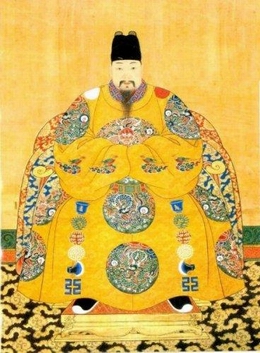 Ming Chengzu (private name: Zhu Di) was the third emperor of the Ming Dynasty in China. He ordered his favorite eunuch Zheng He to launch major voyages of exploration into the South Pacific and Indian Oceans. He re-established another (and primary) capital in Beijing. He repaired and reopened the Grand Canal and, between 1406 and 1420, directed the construction of the Forbidden City. He also greatly expanded the imperial examination system in place of his father’s use of personal recommendation and appointment. These scholars completed the monumental Yongle Encyclopedia during his reign.
Ming Chengzu (private name: Zhu Di) was the third emperor of the Ming Dynasty in China. He ordered his favorite eunuch Zheng He to launch major voyages of exploration into the South Pacific and Indian Oceans. He re-established another (and primary) capital in Beijing. He repaired and reopened the Grand Canal and, between 1406 and 1420, directed the construction of the Forbidden City. He also greatly expanded the imperial examination system in place of his father’s use of personal recommendation and appointment. These scholars completed the monumental Yongle Encyclopedia during his reign.

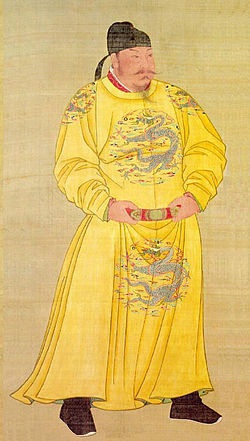
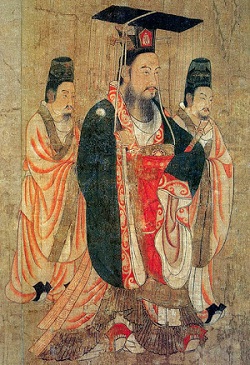
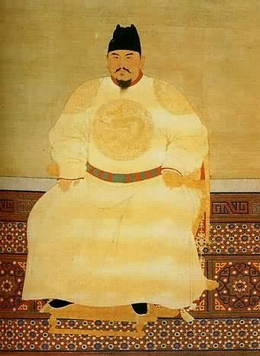
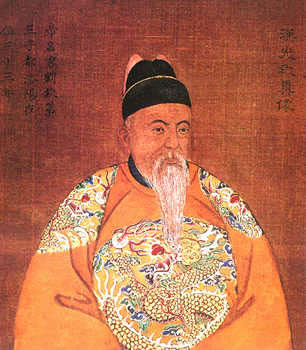

who was the emperor who ordered all people to return to their birth place and china prospered?
Rank the following in order from most influential to least, give a reason for each: Wu Di, Confucius, Qin Shi-Huangdi, and Liu Bang.
Sry my friend did that
sorry but i think the private name for Song Taizu (6) is not correct…..should be 赵匡胤 (zhao kuangyin)
It is a foolish mistake. Thanks for your correction.
It is a foolish mistake. Thanks for your correction.